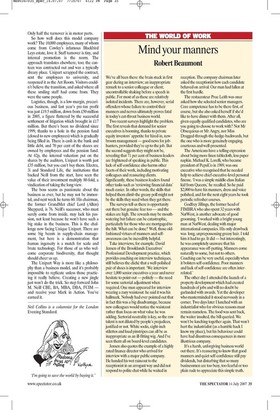Mind your manners
Robert Beaumont We've all been there: the brain stuck in first gear during an interview; an inappropriate remark to a senior colleague or client; uncontrollable shaking before a speech in public. For most of us these are relatively isolated incidents. There are, however, serial offenders whose failure to control their manners and nerves ultimately proves fatal in today's cut-throat business world.
Two recent surveys highlight the problem. The first reveals that demand for senior executives is booming, thanks to private equity investors' appetite for hired-in, newbroom management — good news for jobhunters, provided they're up to the job. But the second suggests they might not be, revealing that 71 per cent of business leaders are frightened of speaking in public. This lack of self-confidence also harms other facets of their work, including motivating colleagues and reassuring clients. Significantly, these business leaders found other tasks such as 'reviewing financial data' much easier. In other words, the skills that helped them climb the greasy poll might not be the skills they need when they get there.
The surveys tell us there is opportunity out there but genuine fear too — and the stakes are high The rewards may be mouthwatering but failure can be catastrophic, particularly for those who are mortgaged to the hilt. What can be done? Well, those oldfashioned virtues of manners and selfawareness can be incredibly helpful.
Take interviews, for example. David Jensen of the Brooklands Executives' Professional Development practice, which provides coaching on interview techniques, still believes the cliché that a well-polished pair of shoes is important. 'We interview over 1,000 senior executives a year and never hesitate to point out — politely — the need for some sartorial adjustment when required. One man appeared for interview wearing a zany waistcoat: he said it was his hallmark. Nobody had ever pointed out that in fact this was a big disadvantage, because new colleagues would notice the waistcoat rather than focus on what value he was adding. Sartorial neutrality is key, so the raw talent is not diluted by people's prejudices, justified or not. White socks, eight-inch stilettos and loud pinstripes can all be as inappropriate as an ill-fitting wig. And I've seen them all on board-level candidates.
Jensen also quotes the example of a highly rated finance director who arrived for interview with a major public company. He handed his wet raincoat to the receptionist in an arrogant way and did not respond to polite chat while he waited in reception. The company chairman later asked the receptionist how each candidate behaved on arrival. Our man had fallen at the first hurdle.
The restaurateur Prue Leith was once asked how she selected senior managers. Core competence has to be there first, of course, but she also asked herself if she'd like to have dinner with them. After all, given equally qualified candidates, who are you going to choose to work with? Not Mr Obsequious or Mr Angry, nor Miss Dragged-through-the-hedge-backwards, but the one who is more genuinely engaging, courteous and well-presented.
The Americans have a telling expression about being more linen tablecloth, less paper napkin. Michael K. Lorelli, who became president of PepsiCo in 1989, was one executive who recognised that he needed help to achieve chief-executive-level personal finesse. 'I was a simple middle-class Italian kid from Queens,' he recalled. So he paid $2,000 to have his manners, dress and voice polished, and for the next eight years he took periodic refresher courses.
Godfrey Jillings, the former head of FIMBRA who also spent 32 years with NatWest, is another advocate of good grooming. 'I worked with a bright young man at NatWest, dealing with major international companies. His only drawback was long, unprepossessing greasy hair. I told him it had to go. It did — but interestingly, he was completely unaware that his appearance was off-putting Manners come naturally to some, but not to others. Coaching can be very useful, especially when it bolsters self-confidence. Poor manners and lack of self-confidence are often interrelated.'
The other day I attended the launch of a property development which had created hundreds of jobs and will no doubt be garlanded with awards. Yet the developer who masterminded it stood nervously in a corner. Two days later I lunched with an industrialist who for obvious reasons must remain nameless. The food was sent back, the waiter insulted, the bill queried. We won't be lunching together again. That won't hurt the industrialist (as a humble hack I know my place), but his behaviour could have had disastrous consequences in more illustrious company.
It's a harsh, unforgiving business world out there. It's reassuring to know that good manners and quiet self-confidence still pay dividends, but disturbing that so many businessmen are too busy, too fearful or too plain rude to appreciate this simple truth.

















































 Previous page
Previous page